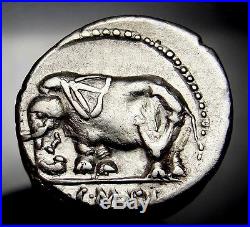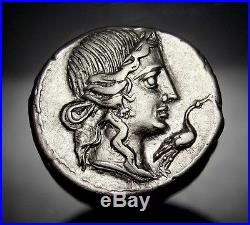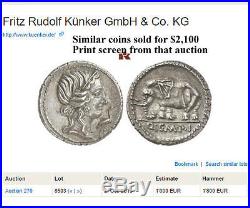



Eucharius Rosslin “Fine Collection”. Dr Rosslin collection is famous for his Mint state Denarius and his Gold iridescent patina denarius. These are the most rarest and valuable amongst collectors and museums. GORGEOUS SHARP SILVER COIN. VERY SHARP, HIGH DETAILS, SUPERB SOUNDING METAL, VERY WELL CENTERED. Indeed, this coin is a gem. Commemorating the Famous battle of Mothul. Legionnaires stand their ground against 84 Nubian war elephants. And won the battle. Quintus Metellus Pius C Cilius. Workshop Name: Northern Italy. 43 (Celicilia) – BMC / RR. 43 pl 100 / (Spain). Obverse Description: Head of Pietas (Piety) diadem right; facing a stork. Description setback: African elephant from the left. Translation reverse: “Quintus Metellus Pius C Cilius Imperator” (Quintus Caecilius Metellus Pius Imperator). Comments about this coin: For this type, Crawford noted an estimate of 88 corners and 98 right corners of setbacks. This type seems rarer than might be forthcoming general works and occurs less frequently than with the Papal instruments. History: Quintus Metellus C Cilius is the son of Quintus C Cilius Numidicus. He began his career in Africa in the war against Jugurtha Marius. Pontiff in 97 BC, praetor in 89 BC Grand pontiff in 82 BC, rallied to Sylla, he shared the consulship with it. Proconsul in Spain between 79 and 72 BC, he was defeated by Sertorius in 79, then in 76 BC when he shared the command with Pompey. Sertorius was finally assassinated in 72 BC He shared the triumph in 71 BC Pompey. Battle of the Muthul. Part of Jugurthine War. Near Muthul River, Numidia. 20,000 men (light infantry, cavalry), 84 war elephants 35,000 infantry men. The Battle of the Muthul was an episode of the Jugurthine War. This battle was fought in 108 BC between the Numidians led by King Jugurtha, and a Roman force under Caecilius Metellus. The Romans were victorious, and four years later Jugurtha was dead, executed by the Romans following his capture byLucius Cornelius Sulla. The Roman historian Publius Rutilius Rufus distinguished himself during the battle, while Gaius Marius’ military genius shone through for the first time, saving the day for the Romans. The Muthul River ran through Adherbal’s old kingdom in eastern Numidia. It has been identified as the Wäd Mellag, [3] and in this case Metellus would have started his campaign in south-east Numidia, with the aim of strengthening his communication links. Other views (Mannert and Forbiger) identify the Muthul with the river Ubus, with Metellus starting his campaign in western Numidia, and later returning to Zama. The objective of Metellus’ army was to reach the interior of Numidia. His army had to descend from the mountains and cross a desert plain, eighteen miles wide to reach the Muthul River where he could refill his water reserves. Jugurtha had deployed part of his infantry and all of his war elephants along the river, under Bomilcar, while all of his cavalry and the best part of his infantry was hidden in a short and bushy ridge along the path the Roman army had to follow. Descending from the mountain pass, Metellus noticed the ambush, but his army needed to refill its water reserves, and thus had to cross the desert without cavalry coverage and within sight of the enemy. So he detached a small force under the command of P. Rutilius Rufus to set up a camp beside the river. The main part of the Roman army moved diagonally towards the Numidian force on the ridge to dislodge them. Jugurtha ordered his infantry to cut off the retreat of the Romans by occupying the mountain pass while the Numidian cavalry charged against the Romans scattering them into small detachments. The Romans were kept in small groups, unable to perform any coordinated movement. Each group was fighting for its own survival, and the Numidian cavalry had control of the battlefield. Bomilcar engaged the troops of Rufus, thus preventing him from aiding Metellus’ troops. At this point an officer who had risen from the ranks, C. Marius, re-organized a few detachments, and led a column of 2000 soldiers through the Numidians to free his commander Metellus. Marius then led the Roman column up the hill against the Numidian infantry, which retreated, leaving the Romans with control of the hill. From this position, Marius led his men against the rear of the Numidian cavalry, uniting the separated Roman detachments into a single army. At the same time, Rufus had held the Numidian force on the river, and succeeded in killing or routing the Numidian elephants. At evening, the two armies met and rejoined. Despite the retreat of the Numidians, the retreat was well-timed by the quick-thinking Jugurtha. As a result, Jugurtha’s forces suffered light casualties compared to the battered Romans. Therefore, the result was somewhat indecisive. The Romans primarily survived the battle thanks to the luck of the Roman scouts prior to the battle, and the inspirational leadership of Marius against the odds. Jugurtha disbanded most of his troops and skilfully and successfully reverted to guerilla warfare. Hearing of the Battle of the Muthul and Metellus’ subsequent manoeuvres against Numidian cities, Romans back home applauded Metellus’ performance. Great joy was manifested at Rome when intelligence was received of the success of Metellus; how he had conducted himself and his army according to the ancient discipline; and had, by his bravery, come off victorious, though under the disadvantage of situation The senate, therefore, appointed public thanksgivings and oblations to the immortal gods for the success of their arms. The city, before full of anxiety for the event of the war, was now filled with joy, and nothing was to be heard but the praises of Metellus. Metellus and Marius drove two columns against the Numidian cities, but Metellus’ defeat at Zama forced the Romans to return to Carthage. Since the Senate did not give him an army, he called for volunteers. He allowed citizen classes that had never been levied previously into the army. Marius thus reformed the Roman army, and went on to conquer Numidia and capture Jugurtha (106 BC). The Senate disliked Marius and gave the title of Numidicus to Metellus, and recognized Marius’ lieutenant Lucius Cornelius Sulla as the conqueror of Numidia. However, Marius retained the support of the people of Rome, and became consul six more times in the following years. Eucharius Rösslin presents Der Rosengarten to Catherine of Pomerania-Wolgast. Eucharius Rösslin (Roslin, Rößlin), sometimes known as Eucharius Rhodion, c. 1470 1526 was a German physician who authored a book about childbirth called Der Rosengarten (“The Rose Garden”) in 1513, which became a standard medical text for midwives. He was an apothecary at Freiburg before being elected physician to the city of Frankfurt on Main in 1506. He served as physician to the city of Worms in the service of Katherine, wife of Henry IV, Duke of Brunswick-Lüneburg. While examining and supervising the city’s midwives, he found their practice of their trade to be careless and substandard, leading to high infant mortality rates. As a result, he wrote his book, publishing it at Strasburg. Rösslin wrote the work in German; it included engravings by Martin Caldenbach, a pupil of Albrecht Dürer. In its illustrations, Der Rosengarten gave for the first time printed figures of the birth chair, the lying-in chamber, and the positions of the fetus in utero. Despite his direct observation of midwifery at Worms, Rösslin incorporated information gleaned from writers of antiquity such as Muscio and Soranus of Ephesus. In the introductory prologue in verseto his text, Rosslin emphasizes the importance of the role of men in reproduction and blames midwives who through neglect and oversight… Destroy children far and wide. He threatens midwives with the warning that God will call them to account. And since no midwife that I’ve asked / Could tell me anything of her task / I’m left to my medical education. The book was an immediate success. He remained in that post until his death in 1526. His son, Eucharius Rösslin the Younger, succeeded his father as town physician. He wrote a book on minerals and mineral use, and published a Latin translation of his father’s book as De partu Hominis in 1532. Terms of Use I. All information which you supply to us is enclosed. We respect your privacy and promise to safeguard the confidentiality of your information. However, in the event that we suspect fraudulent or otherwise unlawful activity, we reserve the right to supply your information to law enforcement agencies. All sales are final ” AS IS ” 6. Guaranty and Return Privilege. All items are guaranteed genuine. The return coin should be in same condition and with original papers COA if applicable. The customer shall bear the cost of returning all items and shall insure them for their full value. TERMS OF SALE 1. The point of sale for all items online is New York. In case of a approved return, the customer shall bear the cost of returning all items and shall insure them for their full value. All payments must be made within 3 days of the invoice date. The item “Nubian war elephant. Dictator SULLA. Famous Battle of Muthul. Silver coin. AU” is in sale since Thursday, January 19, 2017. This item is in the category “Coins & Paper Money\Coins\ Ancient\Roman\ Republic (300 BC-27 BC)”. The seller is “ancientcoins.market” and is located in Manhattan New York. This item can be shipped worldwide.
- Denomination: Denarius
- Grade: Outstanding
- Cleaned/Uncleaned: Uncleaned
- Composition: Silver
- Date: 108 BC
- Country/Region of Manufacture: Italy
- Certification: NGC is advisable for encapsulation
- Provenance: From Dr. Eucharius Rosslin “Fine Collection”

